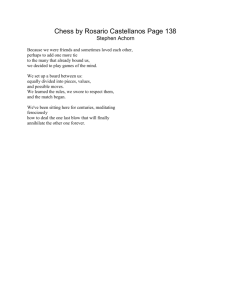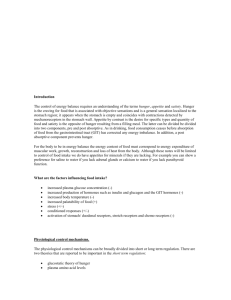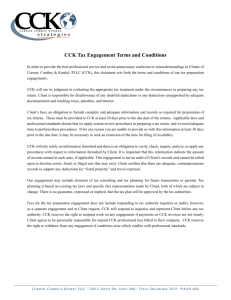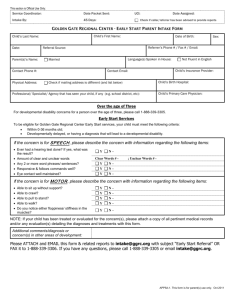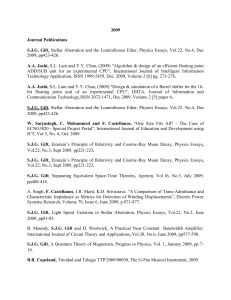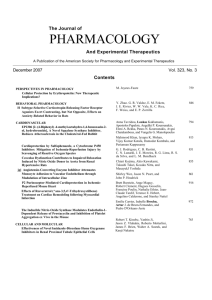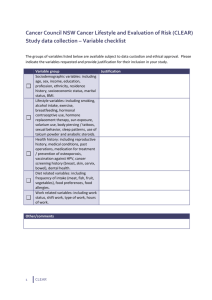Publications and Manuscripts During Graduate Work
advertisement
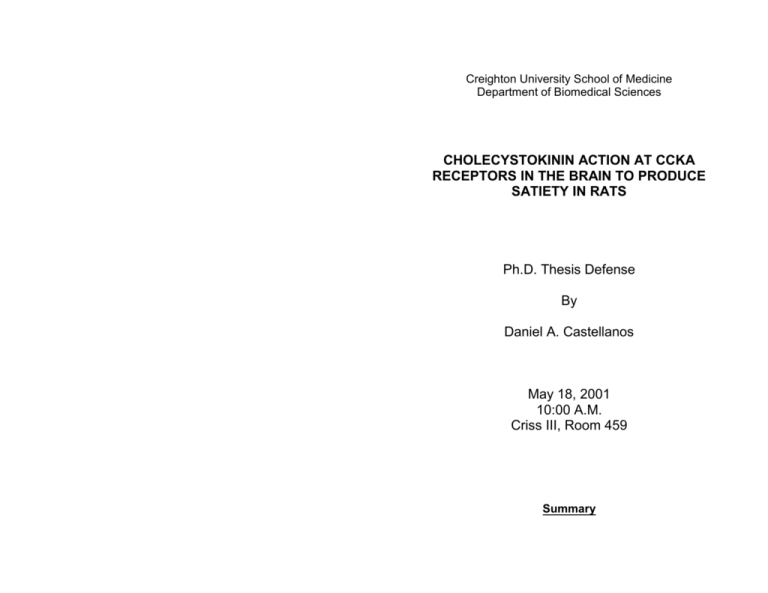
Creighton University School of Medicine Department of Biomedical Sciences CHOLECYSTOKININ ACTION AT CCKA RECEPTORS IN THE BRAIN TO PRODUCE SATIETY IN RATS Ph.D. Thesis Defense By Daniel A. Castellanos May 18, 2001 10:00 A.M. Criss III, Room 459 Summary Cholecystokinin (CCK) is a peptide that is found throughout the brain and in neurons and endocrine cells of the gastrointestinal tract. Studies demonstrating that systemic administration of the CCKA receptor antagonist devazepide increases food intake in a variety of species provide compelling evidence that CCK plays an essential role in producing the satiation that occurs with ingestion of a meal. Given that devazepide readily penetrates the blood-brain barrier, it remains to be determined whether endogenous CCK is acting peripherally, within the brain, or at multiple peripheral and central sites to produce satiety. doctoral program at Creighton University in August 1991. In 1999 he began working at the University of Miami, Department of Neurological Surgery, The Miami Project to Cure Paralysis. Graduate Committee Roger D. Reidelberger, Ph.D. (Major Advisor) In this study we used the CCKB receptor antagonist L365, 265, and two different CCKA receptor antagonists, devazepide, which freely crosses the blood brain barrier, and A70104, which does not, to further define the receptor subtype and site of action of endogenous CCK to produce satiety. Experiments were designed to 1) determine whether endogenous CCK acts at CCKA or CCKB receptors to inhibit food intake; 2) determine whether endogenous CCK acts as an essential satiety factor at different times across the diurnal cycle; and 3) determine whether endogenous CCK acts at CCKA receptors central or peripheral to the blood brain barrier to produce satiety. Richard F. Murphy, Ph.D. Robert Creek, Ph.D. Thomas E. Adrian, Ph.D. William Jefferies, Ph.D. These experiments produced several new findings. First, IV injection of the CCKA receptor antagonist devazepide at a dose that stimulates food intake in rats (1mg kg-1), had no effect on Biography: Mr. Daniel Castellanos graduated from University of Nebraska with an MS in Biology in 1987. He began his duodenal delivery of oleic acid in rats. Am. J. Physiol. 269: R1420-R1433, 1995. Castellanos,D.A. and R.D. Reidelberger. Duirnal variation in the effects of type A CCK receptor antagonist devazepide on meal pattern in rats. Ann. N.Y. Acad.Sci. 713:429-430, 1994. Reidelberger, R.D., V. Gabor, L. Ralf-Marco, D.A. Castellanos, G.L. Rosenquist, H.C. Wong, and J.C. Walsh. Cholecystokinin suppresses food intake by a nonendocrine mechanism in rats. Am. J. Physiol.267:R901-R901, 1994. Blevins, J.E., R.B. Mackin, J.A. Knezetic, D.A. Castellamos and R.D. Reidelberger. Effects of intravenous and paraventricular nucleus injections of leptin on food intake in rats. Appetite27:267, 1996 (abstract) Gastrin-induced stimulation of gastric acid secretion in rats, an action that is mediated by the CCKB receptor ,and that was blocked by the CCKB receptor antagonist L365, 260. This finding further supports the hypothesis that endogenous CCK acts at CCKA receptors, not CCKB receptors, to produce satiety. Second, IV injection of the CCKA receptor antagonist devaepide significantly stimulated cumulative 4-h food intake at 0, 16 and 20 h after dark onset by 31%, 54%, and 40% respectively, yet had no effect on food intake at 4, 8 or 12 h after dark onset. Devazepide-induced increases in food intake occurred through an increase in meal frequency not meal size. These results suggest that endogenous CCK plays an essential role in producing satiety in rats only during several hours before and after the onset of the dark period. It is likely that at other times of the day, greater degree of redundancy in satiety signaling occurs such that CCK receptor blockade produces little if any effect. Third, IV infusion of the CCKA receptor antagonist A-70104 (1000 nmol kg-1 h-1) for 3 h during the early dark period completely reversed the 70% reduction in food intake produced by a maximal 3-h inhibitory dose of CCK-8 (10 nmol kg-1 h-1 IV). In contrast, this dose of A-70104 had no effect on food intake when administered alone under the same conditions in which devazepide (1 mg kg-1 IV) increased food intake by more than 50%. A-70104 (1000 nmol kg-1 h-1) also did not reverse the 40% reduction in food intake produced by a 2-h duodenal infusion of oleic acid (460 mol h-1), an effect that was completely reversed by devazepide. Because devazepide readily penetrates the blood brain barrier, while A-70104 does not, these results suggest that endogenous CCK produces an essential satiety action mediated by CCKA receptors located in brain regions beyond the blood-brain barrier. Publications and Manuscripts During Graduate Work Castellanos, D.A. and R.D. Reidelberger. Effects of peripheral cholecystokinin receptor blockade on food intake in rats. Am. J. Physiol., submitted Schumm,M.A., D.A. Castellanos, and J. Sagen. Chromaffin cells exert a trophic effect on neural progenitor cells in vitro. Exper. Neurol., submitted Sagen,J., D.A. Castellanos, H.M. Bramlett, E.D. Potter, S. Chen, W.D. Deitrich. Robust survival of neural stem cell grafts in gray and white matter regions following fluid percussion brain injury. Amer. Soc. Neural Transpl. And Repair Abstr. 8:69, 2001 (abstract) D.A. Castellanos, P. Tsoulfas, B.R. Frydel, C.W. Hunter, S.R. Rendon, S. Chen, Y. Felipe, and J. Sagen. Enhanced survival of genetically modified neural stem cell transplants in the spinal cord following neurotrophin-3 treatment in vivo or in vitro. Soc. Neurosci. Abstr. 26 (1): 873, 2000 M.A. Schumm, D.A. Castellanos, S.A. Mason, B.R. Frydel, J. Huang and J. Sagen. Chromaffin cells exert a trophic effect on neural progenitor, cells in vitro. Soc. Neurosci. Abstr. 26 (1): 899. 2000. (abstract) Mason, S.A., D.A. Castellanos, C.W. Hunter, B.R. Frydel, X.T. Nie, and J. Sagen. Adrenal medullary transplants in th espinal subarachnoid space may provide trophic support following peripheral nerve injury. Amer. Soc. Neural Traspl. and Repair Abstr. 7:46, 2000. (abstract) Schumm, M.A., D.A. Castellanos, S.A. Mason, B.R. Frydel, and J. Sagen. Trophic effects of chromaffin cells on neural progenitors in vitro. Amer. Soc. Neural Trasnpl. and Repair Abstr. 7:42, 2000. (abstract) Castellanos,D.A., J.F. Kerwin Jr. and R.D. Reidelberger. Effects of peripheral CCK-A receptor blockade on food intake in freely feeding rats. Obes Res 3:377S, 1995. (abstract) Hunter,C.W., B.R. Frydel, D.A. Castellanos, X.T. Nie and J. Sagen. Strategies to reduce inflammatory responses to grafts in the spinal subarachnoid space. Amer. Soc. Neural Trasnpl. and Repair Abstr. 7:63, 2000. (abstract) Caban, A.J., J.W. Lee, A. Hama, C.W. Hunter, D.A. Castellanos and J. Sagen. Nicotinic Agonist epibatidine enhances the antinociceptive effects of intrathecal adrenal medullary transplants. Soc. Neurosci. Abstr. 26(1):937, 2000. (abstract) Bes,J.C., B.R. Frydel, W.M. Walters, E.D. Potter, D.A. Castellanos, J.P. Brunshwig and J. Sagen. Generation of chromaffin cell precursors from human embryonic adrenal gland for potential use in transplantation. Soc. Neurosci. Abstr. 26(1):829, 2000. (abstract) Bes, J.C., W.M. Walters, E.D. Potter, D.A. Castellanos, J.P. Brunschwig and J. Sagen. Ultrastructural characteristization of chromaffin cell progenitor cultures. Amer. Soc. Neural Transpl. and Repair Abstr. 7:42, 2000. (abstract) Wotman,T., D.A. Castellanos, and R.D. Reidelberger. Role of cholecystokinin in the anorexia produced by
